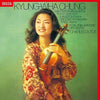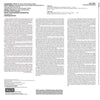



Saint-Saens, Ravel, Chausson - Pieces for violin and orchestra - Kyung-Wha Chung and Charles Dutoit
Camille Saint-Saëns - The Introduction and Rondo Capriccioso in A minor Op. 28 & Havanaise for Violin and Orchestra Op. 83
Amédée-Ernest Chausson - Poème for Violin and Orchestra, Op.25
Maurice Ravel - Tzigane for violin and Orchestra
Kyung-Wha Chung (violin)
Charles Dutoit (conductor)
Royal Philharmonic Orchestra
1 LP, standard sleeve
Original analog Master tape : YES
Heavy Press : 180g
Record color : black
Speed : 33 RPM
Size : 12'’
Stereo
Emil Berliner Studio
Record Press : Pallas Group GmbH in Germany
Label : Analog Phonic
Original Label : Decca
Recorded 20 Jan & 29 Apr 1977 in Kingsway Hall, London
Side 1 :
- Engineered by Colin Moorfoot & Simon Eadon
- Produced by James Mallinson
Side 2 :
- Engineered by Kenneth Wilkinson & John Pellowe
- Produced by Christopher Raeburn
Remastered by Rainer Maillard at Emil Berliner Studios
Originally released in 1977
Reissued in Apr. 2019
Tracks:
Side A
- CHAUSSON: POÈME for Violin and Orchestra, Op.25 (16:33)
- SAINT-SAËNS: INTRODUCTION AND RONDO CAPRICCIOSO for Violin and Orchestra, Op.28. (9:09)
Side B
- SAINT-SAËNS: HAVANAISE for Violin and Orchestra, Op.83 (9:26)
- RAVEL: TZIGANE for Violin and Orchestra (9:00)
Reviews:
« These four pieces fit very well together; the more especially because the two Saint-Saëns contributions, very similar in style, are on separate sides. For this particular programme is it difficult to think olf a more suitable soloist than Kyung-Wha Chung, whose finger-tips throw off the fireworks (or the approach shots to fireworks) with ease, and who affords the more melting passages (in better supply) a sweetness which suits them ideally. Perhaps there will be a few listeners who would like, reasonably, the Tzigane to have a bit more passion, a bit more fire. perhaps I would like it myself. But all of us are possibly up the wrong tree, for it may be that the final degree of fire and passion in the violin sound is there all the time, and that what the ear needs in this piece is a rather stronger recording of the soloist. This could well be, for the recorded balance is that of the concert-hall, and composers do often have in their mind’s ear (their scoring declares) a rather more forward balance for their string soloist than the concert-hall really allows. » Gramophone
Rating:
Discogs : 5 / 5


